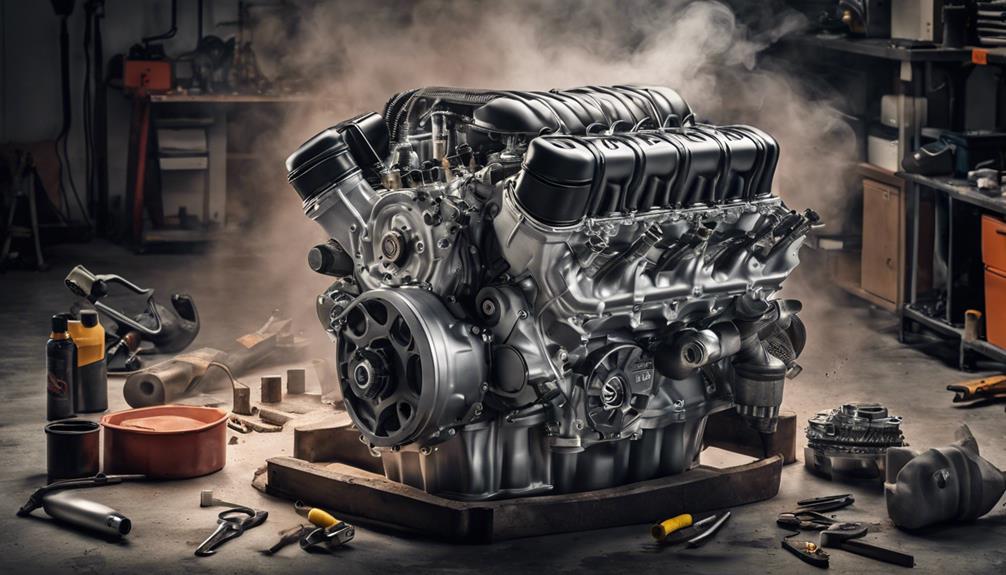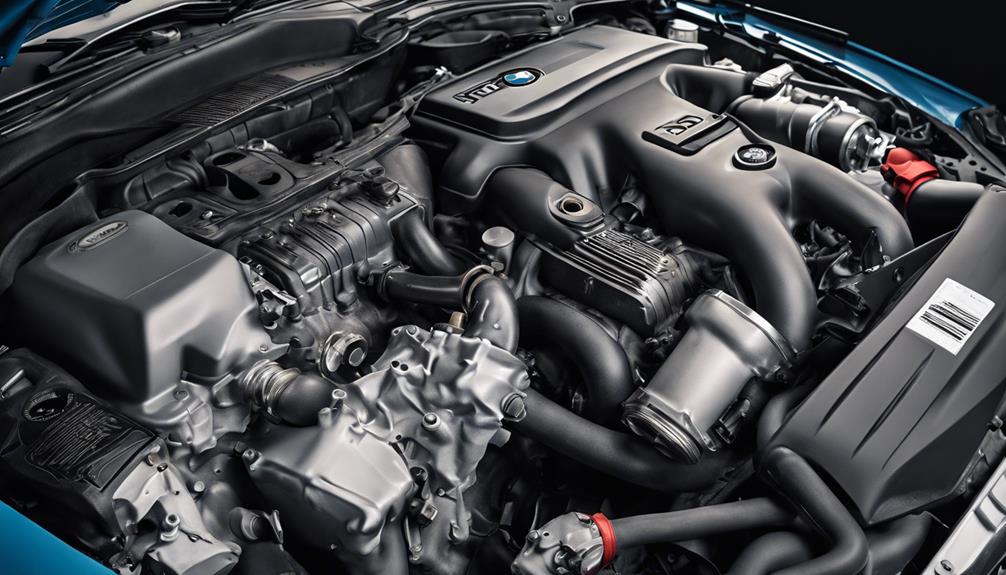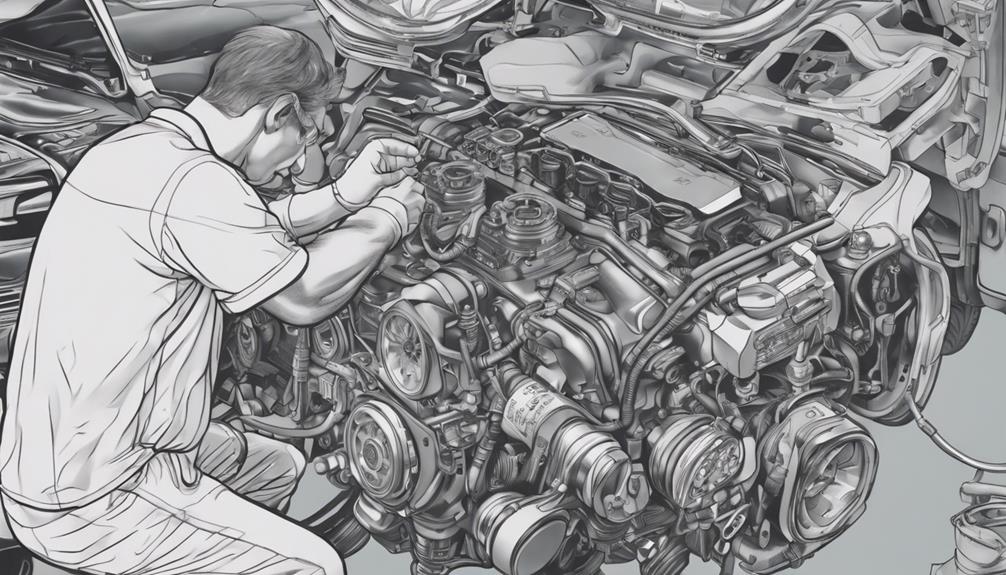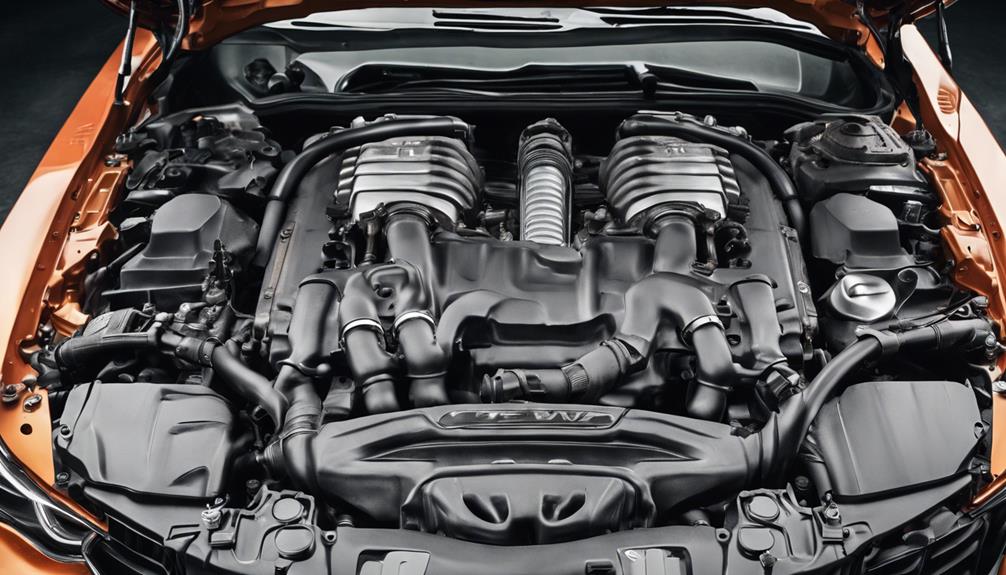So you've got your hands on a BMW M3, huh? Get ready to deal with some engine noise signaling potential issues, vehicle stalling that threatens driving safety, and pricey engine replacements that could hit you with a bill exceeding $3,000. Don't forget about those transmission troubles and the agonizing absence of a spare tire in some models. Oh, and keep an eye out for radiator cracks, ignition hiccups, and the notorious throttle body actuator failures. Buckle up; the journey through BMW M3's common problems is just beginning!
Key Takeaways
- Engine noise signals potential issues; costly repairs may exceed $3,000.
- Vehicle stalling due to fuel pump failures poses safety risks.
- Maintenance crucial to prevent engine failure around 70,000 miles.
- Lack of spare tire in some models impacts roadside assistance.
- Radiator, idle control valve, ignition, oil leaks, and throttle body actuator issues are common.
Engine Noise
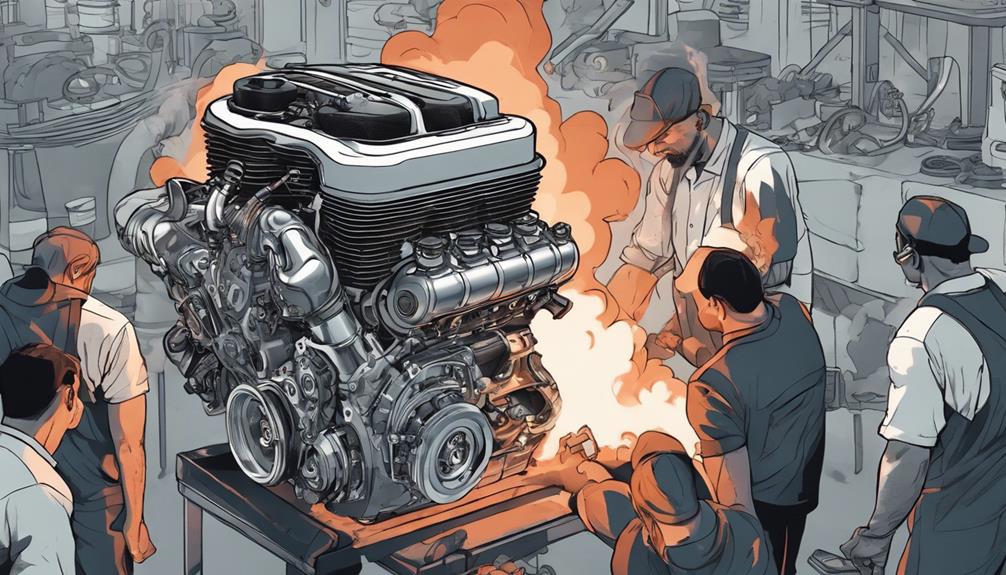
If you ever hear a suspiciously loud rumble coming from your BMW M3's engine, don't just brush it off as mere noise pollution – it could be the first warning sign of a potentially costly problem brewing under the hood. Engine noise is a common issue among BMW M3s, often surfacing as early as 54,000 miles and indicating underlying problems that can lead to performance issues. The repair costs associated with addressing this concern can be substantial, with some cases requiring engine replacements exceeding $3,000.
BMW has taken steps to address this problem by issuing recalls and Technical Service Bulletins (TSBs) for certain M3 models affected by loud internal engine noise. It's important to promptly inspect any unusual sounds emanating from your M3's engine to avoid further damage and prevent more expensive repairs down the line. By addressing engine noise early on, you not only protect your wallet from hefty repair bills but also guarantee the top-notch performance of your beloved BMW M3.
Vehicle Stalling
Experiencing sudden stalling in your BMW M3 can present a serious safety concern, potentially compromising essential driving functions like power steering and braking assistance. Imagine cruising down the road in your sleek M3, only to have it unexpectedly come to a halt – not the vital stop you'd in mind.
These stalling episodes, often linked to fuel pump failures in older models, can catch you off guard at any speed, turning your exhilarating drive into a nerve-wracking ordeal. Picture trying to navigate a tight corner without power steering or needing to brake suddenly without braking assistance; not the ideal scenario in a high-performance vehicle like the BMW M3.
To safeguard your safety and the continued enjoyment of your driving experience, addressing these stalling issues promptly is essential. Don't let a faulty fuel pump stall your joy ride – get your M3 checked and back on the road where it belongs.
Engine Failure

Sudden stalling incidents in your BMW M3 may just be the tip of the iceberg when it comes to potential issues, with engine failure lurking around the corner as a costly and disruptive concern. Engine failure in BMW M3 models typically rears its ugly head around the 70,000-mile mark, causing headaches and wallet woes. While detailed reports on the exact causes are as rare as a sunny day in Seattle, BMW hasn't left you completely stranded. The manufacturer has issued recalls and technical service bulletins for some models experiencing this dreaded fate.
When faced with severe engine failure in your BMW M3, be prepared for a financial hit that could make your wallet weep – repair costs can soar past a staggering $26,000. However, don't lose hope just yet. Engaging in regular maintenance and addressing issues promptly can go a long way in preventing or at least lessening the risk of engine failure. Remember, a little TLC now could save you from a lot of heartache later.
Transmission Issues
When facing transmission issues with your BMW M3, prepare for potential costly repairs and safety concerns looming ahead. Transmission problems in BMW M3 can be a real headache, not just for your wallet but also for your peace of mind.
Imagine being stuck in traffic, only to have your BMW M3 decide it's had enough and just stop moving due to a faulty transmission. It's not just an inconvenience; it's a safety hazard. The last thing you want is to be stranded on the side of the road, waiting for a tow truck to rescue your prized possession.
These transmission issues are no joke; they can hit your bank account hard with repair costs that will make you wince. So, if you start noticing any unusual noises, slipping gears, or delays in shifting, don't ignore them. Addressing transmission problems promptly is key to preventing further damage and even more costly repairs down the road.
Stay vigilant, keep an eye (and ear) out for any signs of trouble, and don't let transmission woes catch you off guard.
Lack of Spare Tire

So, you're cruising along in your BMW M3, feeling the power of the engine, when suddenly… a flat tire!
But wait, where's your spare tire? That's right, some BMW M3 models skip this essential safety feature, leaving you stranded without a quick fix.
Without that trusty spare, you might find yourself relying on roadside assistance or makeshift solutions to handle unexpected blowouts.
No Emergency Tire Access
Unexpectedly finding yourself with a flat tire in a BMW M3 that lacks a spare can quickly turn a smooth ride into a frustrating ordeal. Not having an emergency tire access presents challenges that BMW M3 owners should be aware of:
- Relying on roadside assistance or tire repair kits becomes necessary.
- Longer wait times for assistance can be expected.
- It may cause potential inconvenience during emergencies.
- Considering alternatives like run-flat tires or portable air compressors is advisable.
- Being prepared for situations requiring a spare tire is essential.
Ensure you have a plan in place to tackle this common issue, as being stranded without a spare tire can be a real headache.
Limited Roadside Assistance
Dealing with the issue of limited roadside assistance due to the absence of a spare tire in certain BMW M3 models, drivers face heightened vulnerability when they come across flat tire emergencies. The lack of a spare tire can leave you stranded, relying on vBulletin Solutions or tire repair kits for help. Here's a look at the potential impact:
| Challenge | Impact | Solution |
|---|---|---|
| No Spare Tire | Risk of being stranded | Consider carrying a portable air compressor or tire sealant |
| Reliance on Roadside Assistance | Delay in getting help | Make sure your roadside assistance plan is up to date |
| Safety Concerns | Vulnerability, especially at night | Plan routes through well-populated areas |
Being prepared and having alternative solutions handy can save the day when your BMW M3 faces a flat tire emergency in the M series.
Handling Tire Blowouts
Lacking a spare tire in certain BMW M3 models can greatly escalate the risk and inconvenience of handling tire blowouts on the road. Here are some key points to keep in mind:
- Some BMW M3 models come without spare tires, posing safety concerns during tire blowouts.
- Being stranded without a spare tire can lead to stressful emergency situations.
- Dealing with a flat tire without a spare can cause delays and potential dangers on the roadside.
- It's advisable for BMW M3 owners to carry a tire repair kit or spare tire as a precaution.
- Preparedness for a tire blowout through having a spare or repair kit can enhance safety and guarantee a smoother driving experience.
Radiator Problems

So, you've noticed your BMW M3 running hotter than a summer day in the desert?
Radiator problems might be at play, causing overheating and potential engine woes.
Coolant leaks can be the sneaky culprits behind these issues, so keeping an eye out for them is key.
Overheating Issues
Experiencing overheating in your BMW M3 often stems from radiator issues, commonly caused by leaks or clogs. When your radiator decides to throw a tantrum, here are a few things to keep in mind:
- Keep an eye out for any telltale signs of a leak, like puddles under your car.
- Make sure to flush your radiator regularly to prevent nasty clogs.
- Inspect the radiator hoses for any wear and tear that could lead to trouble.
- Don't ignore overheating warnings; your engine won't appreciate the sauna.
- Remember, a well-maintained radiator is the key to keeping your BMW M3 cool and collected on the road.
Coolant Leaks
Detecting coolant leaks in your BMW M3 can be an important early warning sign of potential radiator problems. Radiator issues like cracks, corrosion, or leaks can lead to inefficient cooling, risking engine overheating and damage.
Keep an eye out for signs such as coolant loss, visible puddles beneath your car, or steam emanating from the engine bay. Addressing these leaks promptly is vital to avoid costly repairs.
Regular radiator system inspections and maintenance are key to catching and resolving these leaks before they escalate. Stay vigilant, as staying ahead of coolant leaks can preserve your BMW M3's performance and save you from overheating headaches down the road.
Idle Control Valve
When faced with a failing Idle Control Valve in your BMW M3, be prepared for potential Check Engine Light triggers and the frustrating limp mode activation. A malfunctioning ICV can disrupt the smooth operation of your beloved car, causing symptoms like rough idle, irregular RPM, and a constant search for a stable idle.
While vacuum leaks may exhibit similar signs, they won't set off a specific diagnostic trouble code, making it essential to diagnose the issue accurately. The only fix for a faulty ICV is a replacement with a new unit, ensuring your engine runs smoothly once again.
Promptly addressing ICV problems is key to preventing further damage and maintaining peak performance in your BMW M3.
- Check Engine Light may illuminate
- Limp mode activation can occur
- Rough idle is a common symptom
- Irregular RPM fluctuations may be noticeable
- Prompt replacement is essential
Ignition Problems

Imagine this: you're all revved up to hit the road, but your M3 is playing hard to get. What gives? Well, bad coils or spark plugs are often the mischief-makers behind these ignition woes.
If your ride is idling rough, RPMs are throwing a tantrum, or it can't seem to find its chill at idle, it's time to give those spark plugs and coil packs a proper check-up. Ignition issues are like drama llamas – they need attention, or they'll keep stealing the spotlight.
To maintain that BMW M3 purr, replacing all your spark plugs and coil packs when ignition problems strike is the golden rule. Keep the spark alive in your M3; it's what keeps you moving forward with style.
Oil Consumption
If your BMW M3 is guzzling oil like it's going out of style, it's time to investigate the root of this thirsty behavior. Here are some insights to help you understand and tackle the oil consumption issue:
- BMW M3's crankcase ventilation system releases oil and carbon particles into the intake, affecting performance.
- Introducing oil into the combustion cycle leads to carbon buildup on intake valves.
- Installing a catch can intercepts oil from the PCV system, ensuring efficient engine operation.
- The catch can prevents oil from reaching the intake, maintaining peak engine performance.
- Addressing oil consumption issues in the BMW M3 can help prevent long-term engine damage.
Oil Leaks

Dealing with oil leaks in your BMW M3 can be a frustrating and messy issue that demands prompt attention to maintain the performance and longevity of your prized vehicle. Aging engines, such as the E92 M3's S65 V8, are often culprits for oil leaks stemming from valve covers.
If you notice buildup on the valve covers, stains on your driveway, or find yourself frequently topping off oil, it's time to investigate. Using oil with a UV dye additive can help pinpoint the source of the leak efficiently.
Keep an eye out for visible oil puddles after parking – a sign that your valve cover gaskets may need replacing. Swiftly addressing oil leaks not only prevents potential engine damage but also ensures your BMW M3 continues to deliver its peak performance.
Throttle Body Actuators
Exploring the intricate domain of BMW M3 maintenance reveals a vital element that often requires attention: throttle body actuators. These components are infamous for causing headaches among M3 owners due to their inclination for failure. Here's what you should know:
- Throttle body actuators in BMW M3 are prone to failure, leading to limp mode, power loss, and triggering diagnostic trouble codes.
- Failure of throttle body actuators can occur without a specific age or mileage pattern, making it essential to monitor their functionality.
- Remanufactured OEM throttle body actuators are available as a cost-effective replacement option for BMW M3 owners.
- Symptoms of throttle body actuator issues include sudden power loss, reduced engine performance, and the vehicle going into a restricted driving mode.
- Addressing faulty throttle body actuators promptly is essential to maintain the best performance and drivability of the BMW M3.
Don't let these tiny but mighty components catch you off guard; stay vigilant and keep your M3 running smoothly!
Rod Bearing Failure
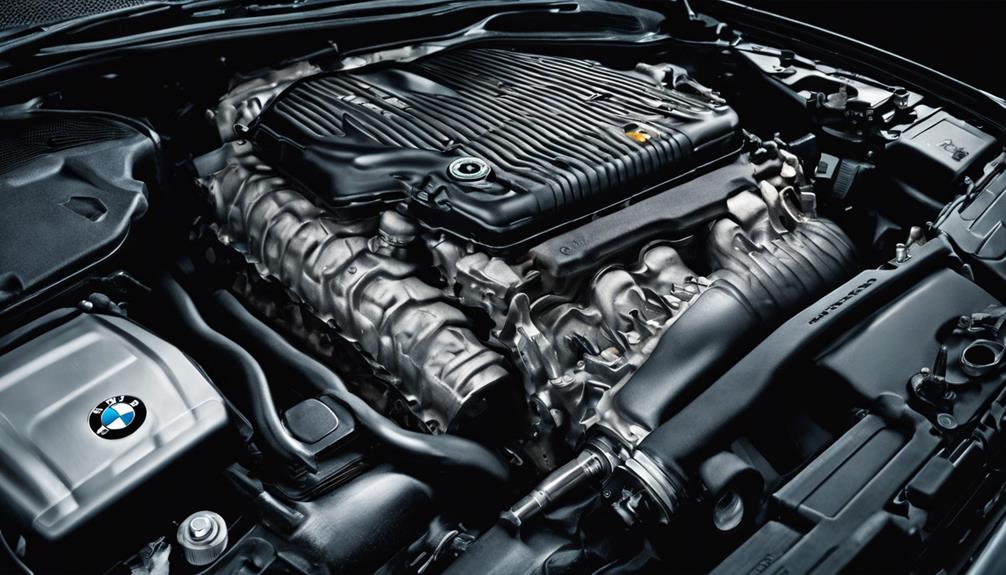
Exploring the domain of BMW M3 upkeep reveals an infamous challenge that requires attention: the ghost of rod bearing failure. This haunting issue, particularly prevalent in the E90/E92/E93 models, tends to rear its ugly head between 70,000 to 100,000 miles, potentially leading to catastrophic engine failure if left unchecked. The telltale signs of this spectral menace include unsettling knocking or tapping noises emanating from the engine, especially noticeable during cold starts or when the engine is under load.
Confronting rod bearing failure in your BMW M3 often necessitates a costly engine rebuild or replacement, casting a shadow over your automotive ownership experience. However, all hope isn't lost, as aftermarket upgraded rod bearings exist as a preemptive strike against this malevolent force, offering a glimmer of protection for your beloved M3's engine. So, if you hear the ominous rapping of failing rod bearings, don't turn a deaf ear – address it promptly to exorcise this ghost from your M3's mechanical heart.
Frequently Asked Questions
Are M3 Expensive to Maintain?
Maintaining an M3 can be pricey. With an average annual cost of $1,161 and a 21% chance of severe issues, expenses add up. Repairs happen around 0.8 times yearly, potentially leading to significant bills.
How Long Will a M3 Last?
You're in luck with a BMW M3 – it can last up to 200,000 miles if you take care of it. With an average annual maintenance cost of $1,161, keeping up with it will guarantee a long-lasting relationship.
Which Year Is the Most Reliable M3?
For the most dependable M3, consider the E46 generation. From 2000 to 2006, this BMW shines with its strong engine and balanced handling. Owners praise its durability and fewer significant problems. Regular maintenance guarantees longevity.
Is the BMW M3 a Reliable Car?
Yes, the BMW M3 can be reliable if maintained well. Regular servicing and care can help prevent common issues. Be attentive to signs of wear and address them promptly. Your diligence can extend the M3's longevity.
Conclusion
Overall, owning a BMW M3 can be a thrilling experience, but it comes with its fair share of common problems. From engine noise to transmission issues, these cars have their quirks that can be frustrating for owners.
However, with proper maintenance and care, these issues can be mitigated. So, buckle up, stay on top of your maintenance schedule, and enjoy the ride in your BMW M3.






